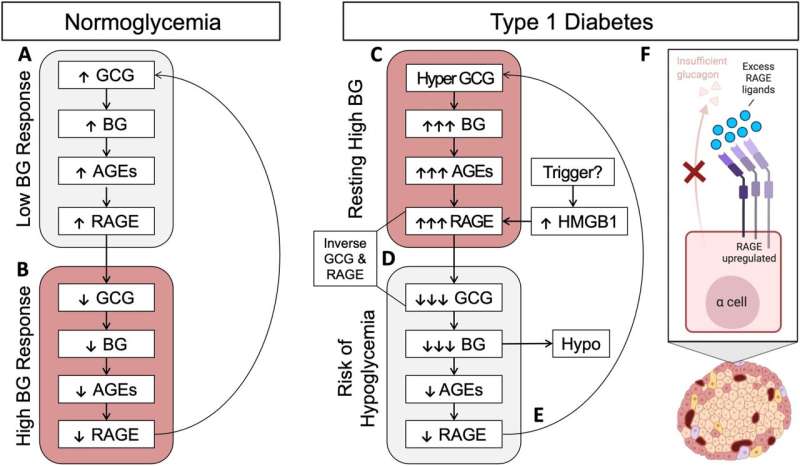This article has been reviewed according to Science X's editorial process and policies. Editors have highlighted the following attributes while ensuring the content's credibility:
fact-checked
peer-reviewed publication
proofread
Researchers discover new link to pancreatic hormone in type 1 diabetes

Researchers have found evidence of inherent changes to the pancreas in people with type 1 diabetes. Published recently in Scientific Reports, these new findings help explain how low blood glucose occurs in type 1 diabetes.
The study was led by Dr. Sherman Leung who completed his Ph.D. at Mater Research under the leadership of Professor Josephine Forbes, Chronic and Integrated Care Program Leader, Mater Research. Dr. Leung and the research team linked the pancreatic hormone glucagon, which is normally associated with increasing blood glucose levels, with the RAGE (Receptor for Advanced Glycation End products) protein in type 1 diabetes.
Dr. Leung said that RAGE is a member of the immunoglobulin "superfamily" of cell surface receptors that regulate the immune response and inflammation.
"To study if there was a role for RAGE in low blood glucose or hypoglycemia, we used pancreatic tissue samples that were generously donated by organ donors who had type 1 diabetes," Dr. Leung said.
Dr. Leung said that this was an exciting result that supported an increasing body of scientific evidence showing that there are inherent changes to the pancreas in type 1 diabetes.
"Scientists have historically viewed type 1 diabetes as an entirely immunological condition," Dr. Leung said.
"However, this paper provides further evidence that changes in the pancreas itself may contribute to the hallmarks of the disease, such as hypoglycemia."
Professor Forbes said that people with type 1 diabetes often face a higher risk of complications such as low blood glucose or hypoglycemia.
"This can lead to irritability, trembling and falling unconscious, requiring immediate medical attention," Professor Forbes said.
"These findings open the door for future research to investigate this association, including in functional settings and with unique treatments options to improve patient outcomes for these disease complications."
Future research is currently underway to collaborate with the broader type 1 diabetes research community in order to carry out these functional experiments to better understand why the RAGE protein may have an effect on low blood glucose levels.
The tissue samples used in the study were accessed through the JDRF nPOD program (Network for Pancreatic Organ donors with Diabetes), which is based at the University of Florida. nPOD's mission is to collect and share tissue samples with researchers who aim to prevent, reverse and cure type 1 diabetes.
"We thank the organ donors and their families for their generous contributions, as well as our collaborators at JDRF nPOD, University of Tennessee Health Science Center and the University of Miami Miller School of Medicine," Dr. Leung said.
More information: Sherman S. Leung et al, Alpha cell receptor for advanced glycation end products associate with glucagon expression in type 1 diabetes, Scientific Reports (2023). DOI: 10.1038/s41598-023-39243-x





















